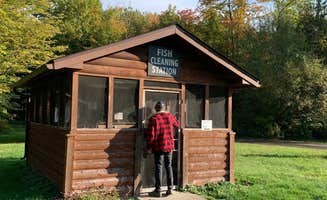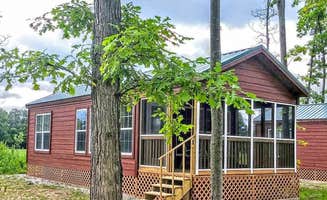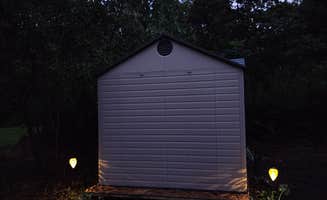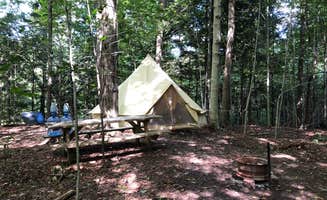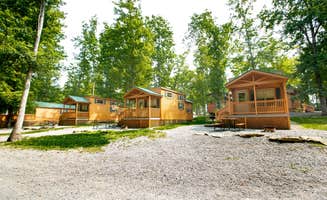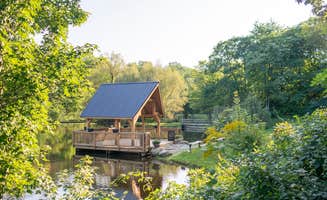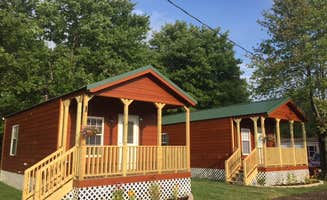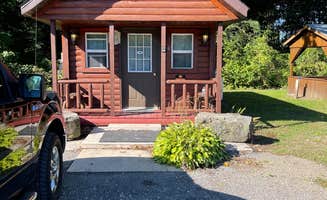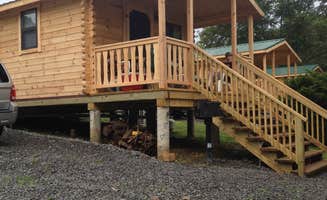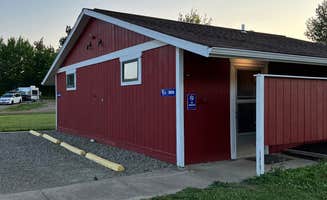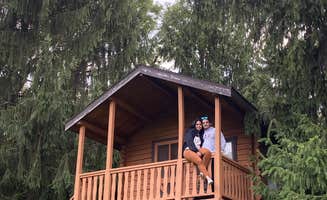Cabin camping near Jamestown, Pennsylvania positions visitors along the shores of Pymatuning Lake, a 17,088-acre reservoir spanning the Pennsylvania-Ohio border. The region experiences four distinct seasons with warm summers averaging 80°F and cold winters that can drop to 20°F. Most cabins throughout the area close seasonally from mid-October through mid-April due to harsh winter conditions and maintenance requirements.
What to do
Fishing access from camp: At Linesville Campground — Pymatuning State Park, cabin guests appreciate the short walk to the marina. "A short walk to the marina which hires boats and sells snacks & fuel. There is a campground fish cleaning station with complimentary fridges/freezers," notes one visitor.
Eagle watching opportunities: Pymatuning Lake hosts nesting bald eagles visible from certain cabin areas. According to one camper at Jamestown Campground — Pymatuning State Park, "The bald eagles sit in the trees not at all bothered by us. Amazing." Eagle spotting is most successful during morning hours when the birds are actively hunting.
Biking trails: Cabin guests can access paved trails around the region. One camper shares, "We took our bikes to Meadville to do the Ernst bike trail (recommended - a paved, flat, easy 6.3 mile cycling trail through the woods and along the river)." Some cabin locations offer direct trail access for cycling, while others require a short drive.
What campers like
Individual bathroom setups: Cabins at Jamestown often feature nearby bathroom facilities with private designs. A camper explains, "All bath houses and restrooms are handicap available with each toilet and shower set up individually. Really nice." This offers more privacy than traditional communal bathrooms.
Swimming options near cabins: Several lakeside cabins provide direct access to swimming areas. At West Branch State Park Campground, a visitor noted, "The camper beach was small but nice and clean. We also took the inflatable kayaks out on the lake twice and it was so smooth and clear." Swimming beaches typically open from Memorial Day through Labor Day.
Winter cabin availability: While most facilities close seasonally, some cabins remain open year-round. Mosquito Lake State Park maintains winter operations with one camper noting, "We went on a holiday weekend and so the campground was PACKED and a little too close for my liking, but for a holiday understandable." Winter cabin reservations often require booking 3-4 months in advance.
What you should know
Uneven sites affect cabin access: Many cabin areas feature terrain challenges. At Mosquito Lake State Park Campground, one camper experienced site flooding: "Unfortunately our campsite was under water due the extensive rains recently this past week and spring overall. But the staff at the camp office gave us a list of all of the open sites that we could choose from so that we could still camp."
Limited connectivity: Cell service varies significantly between cabin areas. Several locations have minimal service, as one camper describes, "Good luck if you're there and the electric cuts out... Horrible WiFi." AT&T typically shows one bar or less in most locations.
Waterfront site definitions vary: Not all "waterfront" designated cabins provide direct water access. One camper shared, "We booked a waterfront site and were disappointed to learn that was not actually the case. There was a little bit of a swampy area behind us but the lake was further away. We could walk to it through the woods from our site on a trail that went behind some other sides."
Tips for camping with families
Dog-friendly cabins: Not all cabins welcome pets, but select locations do. At Mercer-Grove City KOA, "The grounds are pretty with tall trees and plenty of amenities for families. Some sites have concrete patios and furniture provided. There is a playground, inground pool, and a store." Pet fees typically run $10-15 per night with restrictions on breed and number.
Kid-focused activities: Some cabin areas organize scheduled events. A visitor noted, "The people that work at the campground are awesome and do many activities with the kids." Weekend programming typically includes crafts, games, or outdoor movie nights during summer months.
Nature exploration tools: Several locations provide resources for children to interact with wildlife. One camper shares, "If your kids are 8 and under they'll love the nature playground and nets provided to catch critters." Nets and identification guides are available at ranger stations during daylight hours.
Tips from RVers
Leveling challenges at cabins: Many cabins and RV sites require significant leveling equipment. At RV Resort Village, a visitor reported, "For Spot 19 you would literally have to move the fire ring and picnic table from spot 18 out of your way. (No they didn't take up 2 spots, they just overlap it's so close)" Bringing additional leveling blocks is recommended.
Alternative water fill locations: Several cabin areas have problematic water fill stations. One visitor notes, "First the water fill is on an incline so when our tank was 'full' pulling away from fill station it was really only 2/3 full. This was okay for a short weekend but not good planning from who ever designed the park." Visitors should consider filling tanks before arrival.
GPS route warnings: Some cabin areas have difficult access roads not accurately reflected in navigation systems. One RVer advises, "We use both the RV Garmin 890 & RV Trip Wizard and both had us doing some crazy side roads to get into the KOA. Be sure to use the park's directions for an easier drive in." Calling ahead for specific driving directions is recommended for larger vehicles.


